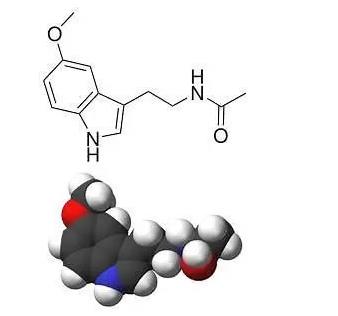Melatonin, also known as N-acetyl-5-methoxytryptamine or pineal gland hormone, is a hormone produced by the pineal gland in the brain. It belongs to the class of indoleamine compounds and has potent antioxidant properties. Melatonin is synthesized and stored in the pineal gland and released into the bloodstream in response to the circadian rhythm, with higher levels being secreted at night.

One of the primary functions of melatonin is to regulate the sleep-wake cycle. It can help improve sleep quality by reducing the time it takes to fall asleep and increasing the duration of deep sleep. Melatonin is also known to have a powerful antioxidant effect, which helps to protect the body against oxidative damage caused by free radicals. Recent research has shown that melatonin may also have potential as a new method for antiviral treatment.
In addition to its sleep-regulating and antioxidant properties, melatonin has been found to play a crucial role in regulating the endocrine system. It can inhibit the release of hormones such as follicle-stimulating hormone, luteinizing hormone, progesterone, and estrogen, which can help regulate the reproductive system. Melatonin also has a significant impact on the immune system, as well as on the central nervous and cardiovascular systems.
However, the production of melatonin can be affected by liver damage, which can lead to decreased levels of the hormone in the body. Melatonin supplements are commonly used to improve sleep quality, with a recommended dosage ranging from 0.1 to 0.3mg. It is also effective in adjusting circadian rhythms and jet lag.
Overall, melatonin plays a critical role in maintaining good health and preventing various diseases. It has been found to regulate circadian rhythms, delay aging, regulate the endocrine system, and have beneficial effects on the immune, central nervous, and cardiovascular systems. Its potent antioxidant properties also make it one of the most effective endogenous free radical scavengers.
